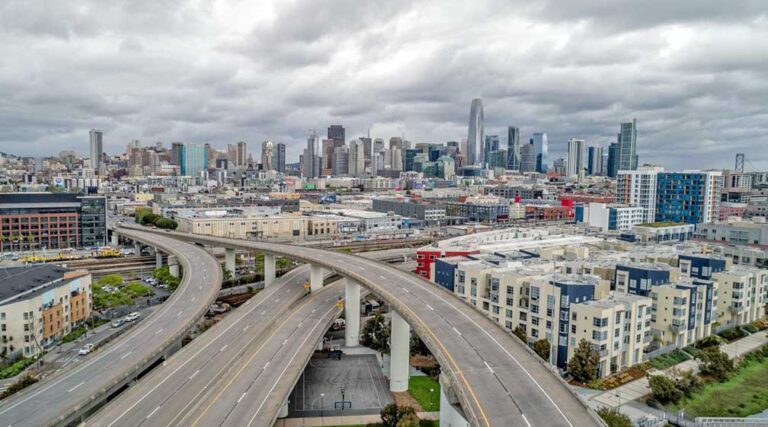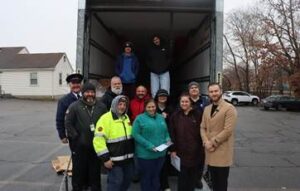WASHINGTON — U.S. Transportation Secretary Pete Buttigieg has announced $3.33 billion in grant awards for 132 projects through the Reconnecting Communities Pilot and Neighborhood Access and Equity discretionary grant programs as part of President Biden’s Investing in America Agenda.
The funding is aimed at reconnecting communities that were cut off by transportation infrastructure decades ago, leaving entire neighborhoods without direct access to opportunity, like schools, jobs, medical offices and places of worship, according to a news release.
“While the purpose of transportation is to connect, in too many communities past infrastructure decisions have served instead to divide. Now the Biden-Harris administration is acting to fix that,” Buttigieg said. “Today we are proud to announce an unprecedented $3.3 billion to help 132 communities deliver better infrastructure that reconnects residents to jobs, health care and other essentials.”
The U.S. Department of Transportation (DOT) has created a virtual story that spotlights communities’ stories, the historic context for the program and the future it seeks through funding the reconnection of communities here.
In this round of funding for the Reconnecting Communities Pilot and Neighborhood Access and Equity program, the DOT is awarding 72 Planning Grants, 52 Capital Construction grants and eight Regional Planning Grants.
Awarded projects
Reconnecting Atlanta’s Southside Communities: Atlanta BeltLine to Flint River Trail in Atlanta is a multi-jurisdictional, regional solution that utilizes an ambitious, multi-use, multi-jurisdictional trail (Trail) to address the challenges that residents of Atlanta’s Southside have endured as the consequences of the construction of major interstates around Hartsfield-Jackson Atlanta International Airport (Airport), the “world’s busiest airport.” In the small railroad towns surrounding the Airport, from East Point to Riverdale, dividing facilities like Interstate 85, Interstate 285 and GA-166 sliced the fabric of residential neighborhoods. This Trail would bridge the transportation barriers to connect schools, hospitals, job centers, Metropolitan Atlanta Rapid Transit Authority (MARTA) rail stations, the BeltLine, and employment centers. The Trail would link disadvantaged communities — a regional collaboration crossing multiple jurisdictions for an area long passed over for federal transportation investments.
The second Atlanta grant is for The Stitch Phase 1 Implementation, a cap of Interstates 75/85, known locally as the “Downtown Connector,” will seamlessly reconnect the torn urban fabric of Downtown with a new major park, extensive transportation improvements, sustainable infrastructure and increased affordable housing. The Downtown Connector was intentionally planned to run through established low-income Black communities as a racially charged method of ridding Downtown of “blighted” areas in favor of new commercially focused development centered around the automobile. The Stitch will provide multi-modal connections over the interstate via multi-use paths, an improved surface transportation network and enhanced transit amenities.
The Reconnecting 4th Ave N: A Two-Way Vision for Reviving Legacy and Inspiring Progress project in Birmingham, Alabama, was awarded a grant for a 15-block Complete Streets redesign of Birmingham’s Black Main Street. The redesign will include converting the road from one-way to two-way and will help reconnect downtown neighborhoods and businesses divided by the construction of Interstate 65 in the 1960s. The project encompasses the Historic 4th Avenue Business District, a once thriving hub of black businesses and community in Birmingham. This multimodal project will help to revive the access and connectivity that helped the community thrive prior to its conversion into a one-way street during the 1970s.
The Broadway Main Street and Supporting Connections is one of two grants awarded to Portland, Oregon, that will construct multimodal safety and streetscape improvements across Interstate 5 in inner North/Northeast Portland, Oregon. The project improves access and connectivity and foster equitable development and restoration in the heart of the city’s historic Black neighborhood, Lower Albina, an underserved community designated as both historically disadvantaged and an area of persistent poverty, and will reconnect Lower Albina to neighborhoods and key destinations across I-5, a major grade separated facility that divided the neighborhood and displaced hundreds of residents when it was constructed.
The second Portland grant, I-5 Rose Quarter Improvement Project will be used for the project’s design and constructing the project’s main reconnecting feature — a highway cover that will support new community space and future development, while reconnecting (Lower Albina to) local streets over I-5 and providing better access to the central city and the waterfront in Portland, Oregon. Building the highway cover is an essential first step to actualizing the community’s vision and improving the transportation network in partnership with the City of Portland.
The Reconciliation, Regeneration and Reconnecting the Selma to Montgomery Trail through Equitable Transportation Infrastructure in Montgomery, Alabama, will reconnect the West Montgomery residents located on the Selma-to-Montgomery Trail to opportunities, access and connectivity by addressing poor social determinants of health that exist because of segregation, redlining, and construction of Interstates 65 and 85. The project identifies many disenfranchised local communities that will benefit by enhancements to the trail. These enhancements will allow the City of Montgomery to reinvest in foundational transportation solutions in Historic West Montgomery to facilitate the renaissance of the Selma-to-Montgomery Trail community.
The Reconnecting Rexburg: Planning & Designing Connections Across U.S. Highway 20 project in Rexburg, Idaho, will address the impacts of the construction of US Highway 20, which had a profound impact on Rexburg residents when what was once a convenient and well-connected community suddenly found itself faced with a significant barrier, disrupting daily routines, and altering the dynamics of everyday life. The City of Rexburg intends to have a professional company research, assess, design and plan the best options for reconnecting the disadvantaged communities that lie on the west side of Highway 20 with the town amenities that are necessary and important for daily living.
The Chinatown Stitch project in Philadelphia will complete the first phase of design and construction work for a highway cap to reconnect Chinatown, a community that is disproportionately impacted by the Vine Street Expressway (Interstate 676). Since its inception in the 1960s, the Vine Street Expressway has represented a threat to the Chinatown community and upon completion in the 1990s, the highway effectively separated the neighborhood into the commercial core of Chinatown to the south and a more industrial area to the North. The proposed project aims to address historic inequities caused by transportation infrastructure, restore community connectivity and improve quality of life.
The full list of Reconnecting Communities Pilot and Neighborhood Access and Equity awards can be viewed here.
Born in Pine Bluff, Arkansas, and raised in East Texas, John Worthen returned to his home state to attend college in 1998 and decided to make his life in The Natural State. Worthen is a 20-year veteran of the journalism industry and has covered just about every topic there is. He has a passion for writing and telling stories. He has worked as a beat reporter and bureau chief for a statewide newspaper and as managing editor of a regional newspaper in Arkansas. Additionally, Worthen has been a prolific freelance journalist for two decades, and has been published in several travel magazines and on travel websites.















